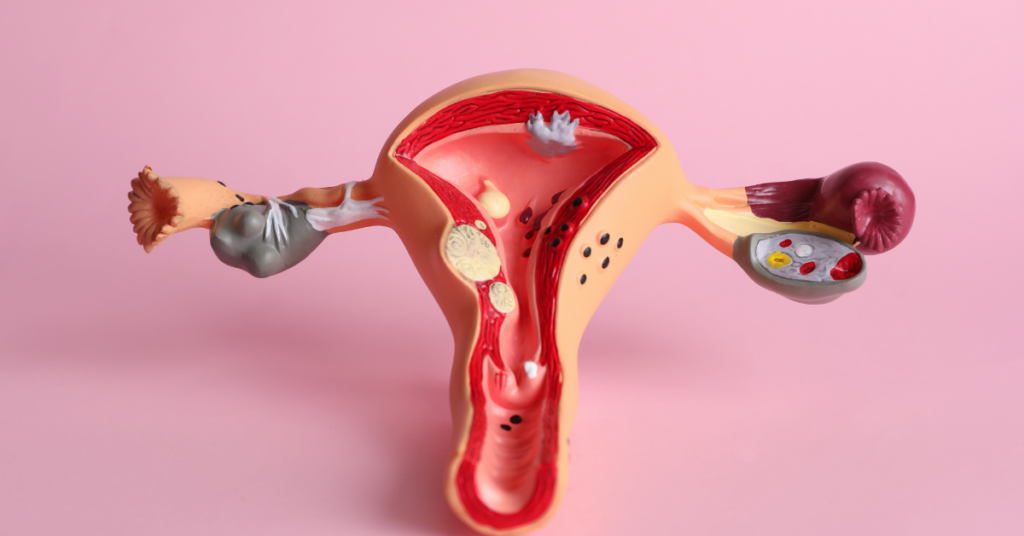What Happens To Estrogen Levels During Menopause
Menopause, usually transpiring in women in their late 40s or early 50s, represents the culmination of their reproductive years. As a natural biological process, it involves various changes, including the cessation of menstrual periods for a minimum of 12 consecutive months.
Within the intricacies of this transformative stage of life, one crucial aspect to explore is the impact of estrogen levels during menopause. Understanding the fluctuations and effects of estrogen during menopause can shed light on the profound journey that women experience.
Definition of Menopause
Menopause is not just the absence of menstruation; it marks significant hormonal changes in a woman’s body. These hormonal changes impact every aspect of a woman’s health, including her physical, emotional and mental well-being. The average age for menopause is around 51 years old, but some women can experience it as early as their mid-30s or as late as their early 60s.
Overview of What Happens to Estrogen Levels During Menopause
During menopause, the levels of estrogen produced by the ovaries drop significantly, leading to a variety of symptoms such as hot flashes, night sweats, mood swings, vaginal dryness, and decreased libido. These symptoms can be disruptive and uncomfortable for women going through menopause.
The process of menopause is much more than just the cessation of menstrual periods. The reduction in estrogen production leads to significant changes in a woman’s body which can impact her overall health.
It is essential for women to understand these changes so that they can make informed decisions about their health during this transition period. Coming up next is a closer look at what happens during the menopausal transition period including perimenopause and menopause itself.
The Role of Estrogen in Women’s Health
Maintaining Bone Density and Preventing Osteoporosis
As women age, the amount of estrogen in their bodies decreases. This decrease can have a significant impact on bone density and lead to osteoporosis. Estrogen plays a crucial role in maintaining healthy bones by inhibiting bone resorption, or the breaking down of bone tissue.
When estrogen levels decrease during menopause, bone resorption rates increase, leading to a loss of bone density. This loss of bone density is not only painful but can also lead to an increased risk for fractures.
It is crucial that women understand the importance of maintaining healthy bones as they age. Engaging in regular physical activity such as weight-bearing exercises and consuming adequate amounts of calcium and vitamin D can help prevent osteoporosis.
Regulating Cholesterol Levels and Reducing the Risk of Heart Disease
Estrogen also plays a role in regulating cholesterol levels in the body. It helps to increase high-density lipoprotein (HDL), or “good” cholesterol, while decreasing low-density lipoprotein (LDL), or “bad” cholesterol. This balance helps reduce the risk of heart disease, which is the leading cause of death for women.
However, when estrogen levels decrease during menopause, this balance can be disrupted and lead to an increased risk for heart disease. Women must take steps to maintain healthy cholesterol levels such as eating a heart-healthy diet rich in fruits, vegetables, whole grains and lean proteins while limiting saturated fats.
Maintaining Vaginal Health and Preventing Urinary Tract Infections

Estrogen also plays a crucial role in maintaining vaginal health by keeping vaginal tissues lubricated and healthy. During menopause when estrogen levels drop off significantly; many women experience vaginal dryness which makes sex painful or even impossible. Estrogen helps to maintain a healthy pH balance in the vagina and prevents bacterial overgrowth that can lead to urinary tract infections.
Without adequate levels of estrogen, women are at a higher risk for developing UTIs which can be painful and lead to more serious health complications. It is crucial for women in menopause to maintain their vaginal health through the use of vaginal lubricants or hormone replacement therapy (HRT) if necessary.
Women should also practice good hygiene habits and avoid douching as it can disrupt the natural pH balance of the vagina. Estrogen plays an essential role in maintaining women’s health throughout their lives.
The decrease in estrogen levels during menopause has profound effects on bone density, cholesterol levels, and vaginal health. As women age and enter menopause, it is crucial that they take proactive steps such as engaging in regular physical activity, eating a healthy diet rich in calcium and vitamin D, avoiding smoking as well as limiting alcohol intake; all of which can help mitigate these effects of low estrogen levels on our bodies while maintaining optimal quality of life.
Physical symptoms of low estrogen levels during menopause
Hot flashes and night sweats:
One of the most well-known symptoms of low estrogen is hot flashes. These sudden sensations of heat can cause flushing of the face, sweating, and an intense feeling of warmth. Night sweats, which are hot flashes that occur during sleep, can disrupt sleep patterns and lead to night-time discomfort.
Vaginal dryness and discomfort:
Estrogen plays a crucial role in maintaining the health and elasticity of the vaginal tissues. With decreased estrogen levels, the vaginal walls can become dry, thin, and less lubricated. This can result in vaginal discomfort, itching, and pain during sexual intercourse, leading to reduced sexual satisfaction and an increased risk of vaginal infections.
Changes in skin and hair:
Estrogen helps keep the skin healthy and vibrant. When estrogen levels decline, the skin may become drier, thinner, and more prone to wrinkles and sagging. Hair may also undergo changes, becoming thinner, drier, and more prone to breakage. These changes can contribute to the perception of aging and impact self-esteem.
Bone density loss and osteoporosis risk:
Estrogen plays a significant role in maintaining bone health by regulating the balance between bone formation and resorption. With decreased estrogen levels, there is an increased risk of bone density loss, leading to osteoporosis. Osteoporosis makes bones more fragile and prone to fractures, particularly in postmenopausal women.
Emotional and psychological impact of low estrogen levels during menopause

Mood swings and irritability:
Low estrogen levels can contribute to mood swings, irritability, and emotional instability. Fluctuating hormones during menopause can affect neurotransmitters in the brain, leading to changes in mood and emotional well-being. Women may experience increased irritability, feelings of anxiety, and heightened emotional sensitivity.
Sleep disturbances and fatigue:
Estrogen levels influence sleep patterns, and the decline of estrogen during menopause can lead to sleep disturbances. Women may have trouble falling asleep, experience restless sleep, or wake up frequently during the night. Sleep disturbances can result in daytime fatigue, reduced concentration, and overall decreased quality of life.
Cognitive changes and memory difficulties:
Some women may experience cognitive changes and memory difficulties during menopause. The decline in estrogen levels can affect brain function and cognitive processes, leading to problems with memory, concentration, and mental clarity. These cognitive changes are often mild, but they can cause frustration and impact daily activities.
It is important to note that the severity and duration of these symptoms can vary among individuals. While some women may experience only mild symptoms, others may have more pronounced effects on their physical and emotional well-being. Consulting with a healthcare provider can help manage these symptoms and improve the overall quality of life during the menopausal transition.
Physical Effects of Low Estrogen Levels During Menopause
Bone Loss and Increased Risk of Osteoporosis: The Shocking Truth
Did you know that low estrogen levels during menopause can lead to bone loss and an increased risk of osteoporosis? That’s right, ladies. Our bodies depend on estrogen to maintain healthy bones.
When estrogen levels drop, so does our bone density. But what does this mean for us?
It means that we are at a higher risk of fractures and breaks as we age. It means that one tumble down the stairs could result in a broken hip, which could then lead to long-term health issues.
So what can we do about it? Don’t just sit back and accept this fate!
Incorporate weight-bearing exercises into your routine, such as jogging or lifting weights. This will help strengthen your bones and prevent further loss.
And make sure you’re getting enough calcium and vitamin D in your diet. Consider taking supplements if you’re not getting enough through food alone.
Increased Risk for Heart Disease: Protect Your Ticker
Another shocking truth: low estrogen levels during menopause increase our risk for heart disease. Estrogen helps regulate cholesterol levels in our body, meaning without it, those levels can become elevated.
Heart disease is the leading cause of death for women in the US, so it’s crucial that we take steps to protect our ticker! Start by eating a heart-healthy diet rich in fruits, vegetables, whole grains, lean proteins, and healthy fats like avocado or olive oil.
Exercise is also important for heart health – aim for at least 30 minutes of moderate activity most days of the week. And don’t forget about stress management – high stress levels can also increase our risk for heart disease.
Summary
Menopause may be an inevitable part of life for women, but that doesn’t mean we have to accept all of its negative effects. By understanding the physical effects of low estrogen levels during menopause and taking proactive steps to counteract them, we can maintain our health, happiness, and independence well into our golden years. So don’t be afraid to speak with your doctor about hormone replacement therapy or other treatment options.
Don’t be afraid to try new exercises or foods that can benefit your body. Embrace this new phase of life with a positive attitude and a determination to take good care of yourself – you deserve it!
Learn more about this topic:
Menopause Symptoms? Click here
Menopause And Mental Health: Exploring The Link Between Menopause And Anxiety/Panic Attacks
Healthy Eating for Menopause Wellness: Nourishing Your Body
Frequently Asked Questions

Q: Which is more beneficial, high or low estrogen levels?
A: Having higher estrogen levels can be more beneficial for various reasons, including its role in protecting the heart from disease. Estrogen helps maintain higher levels of good cholesterol, known as high-density lipoprotein (HDL), which is important for cardiovascular health. Conversely, lower estrogen levels, particularly during menopause, can increase the risk of developing heart disease.
Q: How can I tell if I need more estrogen during menopause?
A: If you’re going through menopause and wonder if you might need more estrogen, there are some signs to look out for. The most common symptoms of low estrogen include hot flashes, flushes, and night sweats. These can make you feel suddenly warm and cause your skin to turn red. If you experience these symptoms, it might indicate that your body needs more estrogen.
Q: When does a woman typically stop producing estrogen?
A: Women usually experience menopause around the age of 50, although it can happen earlier. The typical age range for menopause is between 45 and 55. During menopause, the production of estrogen and progesterone hormones ceases in the ovaries.







